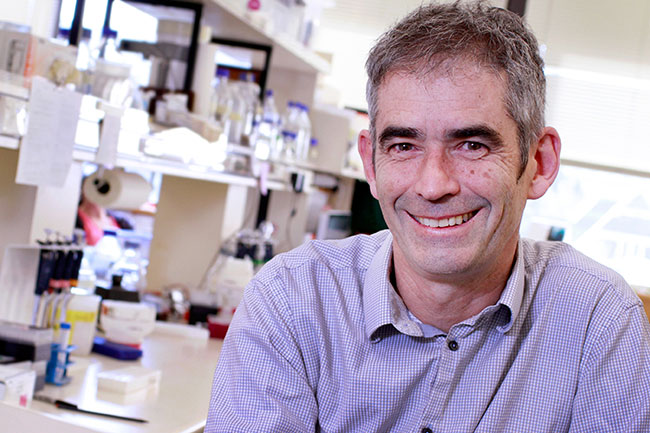 Tuesday 24 April 2018 1:41pm
Tuesday 24 April 2018 1:41pm
Professor of Biochemistry Dr Parry Guilford
A simple blood test could provide a significant step to reducing health inequities for Māori cancer patients.
Professor of Biochemistry Dr Parry Guilford from the University of Otago is working on a test that would detect DNA that spills out from cancerous tumours and into the blood stream.
Professor Guilford says the test would provide a useful measure of whether or not a cancerous tumour is growing or shrinking.
“That's important because it means that by using a simple blood test you can see whether treatment is working or not,” Professor Guilford says.
If someone has finished treatment, you can keep an eye on them and see if it's coming back or not.”
The DNA blood sampling method is widely used by researchers internationally, and could in principle be applied to monitor every form of cancer because they all release DNA into the blood stream.
Professor Guilford has been working to adapt the technology to New Zealand conditions, and trying to reduce the cost to make it accessible for all patients.
Among the developments are identifying a tube that is able to keep the samples stable for two weeks.
“It means that sample can go on the bus from Ruatoria and if the bus breaks down along the way, it can still be used within two weeks.
“It's a really powerful thing.”
Professor Guilford says hospital scans and X-rays have a number of limitations, and hopes the new method would provide an earlier indication on whether the treatment is working for Māori patients.
“Those scans are only available at the bigger hospitals, which makes it tougher for Māori who live in rural parts of the country,” he says.
“That technology is also quite expensive, there's a significant queue, and because of the radiation, you can only get them every eight to 10 weeks.”
A second trial involving non-Māori patients living in rural communities will also take place at a later date.
Professor Guilford says the new method could be critical in improving health inequities facing Māori and those in isolated parts of the country.
“Whether it be rural GPs or clinics on marae, this has a real potential to take this surveillance of patients in treatment away from hospitals and out to the communities,” Professor Guilford adds.
Consultations with Māori are due to get underway in the coming weeks. Anyone interested in being involved to help develop the technology is being encouraged to contact Professor Guilford.
This research is a key part of Healthier Lives - He Oranga Hauora, a National Science Challenge which is working on research to reduce inequities in cancer and other non-communicable diseases in New Zealand.
For more information contact:
Professor Parry Guilford
Director
Cancer Genetics Laboratory
University of Otago
Tel +64 3 479 7673
Cell +64 27 221 5633
Email parry.guilford@otago.ac.nz
A list of Otago experts available for media comment is available elsewhere on this website.
Electronic addresses (including email accounts, instant messaging services, or telephone accounts) published on this page are for the sole purpose of contact with the individuals concerned, in their capacity as officers, employees or students of the University of Otago, or their respective organisation. Publication of any such electronic address is not to be taken as consent to receive unsolicited commercial electronic messages by the address holder.
